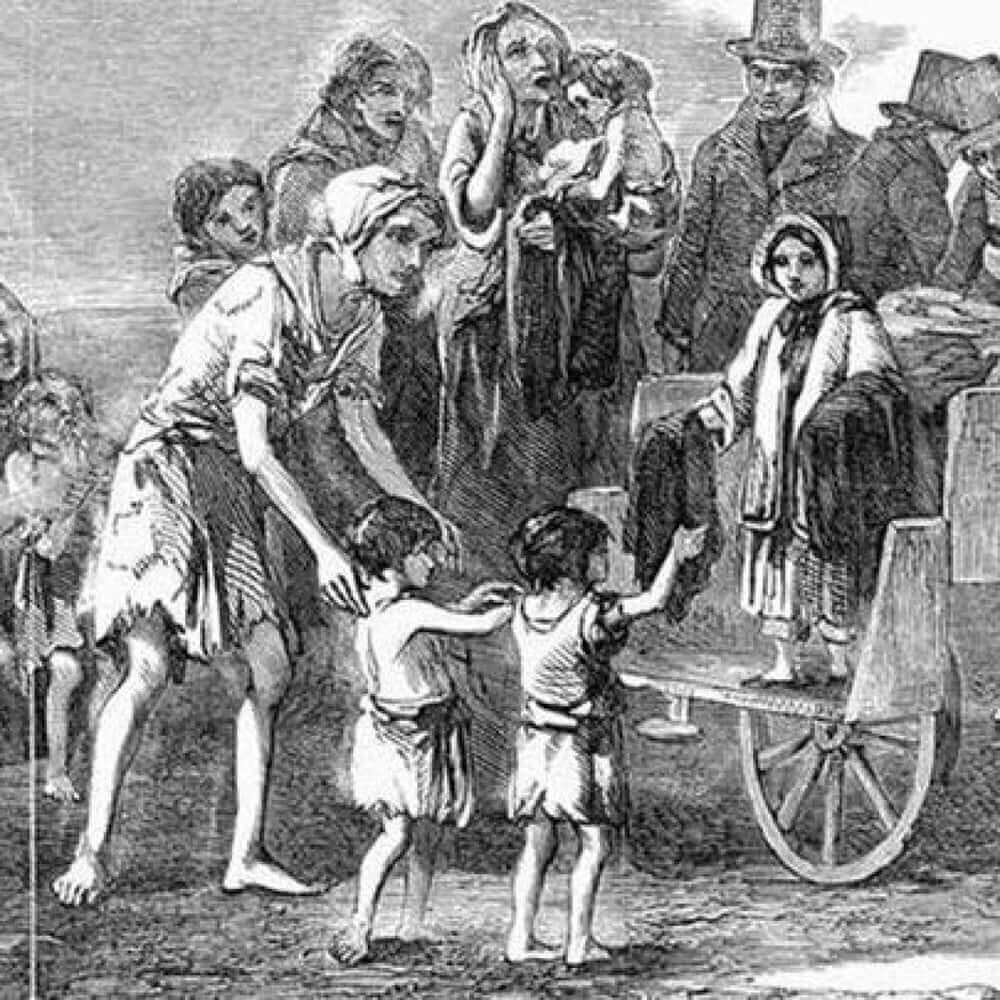
In this article, we will be discussing the Irish Potato Famine, because I felt like it was a good week to give a shout out to the Irish people. Even if it’s with a pretty awful moment from their past. To all of your Irish readers, and I know there are a few, please let us know what we get wrong in this article.
The Irish Potato Famine, or the Great Hunger, began in 1845 and nearly destroyed the entire country. But, as most of us may know, the Irish are a stout people and their country survived to become one of the most beautiful and welcoming countries I’ve ever had the pleasure of visiting.
However, at this point, they were truly in a bad way. Hopefully, during this article we can make it clear to you readers just how awful this famine truly was and how hard it made the lives of the Irish at the time. Because, you may well joke about this being a thing, but at this point, this was like their WWII (but with spuds).
We WILL also be answering the age-old question: Were there no potatoes, or were there only potatoes?
Prior to the famine, Ireland was a part of the UK. At this point the UK was referred to as the “United Kingdom of GB and Ireland”. Being a part of the UK gave them representation in parliament.
However, their representation wasn’t very legitimate. The Irish were represented by the British mainly in Parliament.
This is mainly due to religion. The main religion of Ireland was (and still is) Catholicism. But due to Penal Laws, Catholics were prohibited from holding elected office. In fact, the Penal Laws restricted a lot of the rights of Catholics.
This disproportion of power is important, because Catholics were mostly not landowners at the time. Instead, most of the land was owned by English families. The English population would make their way to Ireland and purchase the lands that Irish Catholics couldn’t afford. Then, Catholics were made to pay rent to their English landowners.
Essentially, the Irish were already placed in the lower class within their own country due to the English.
THE POTATO
It’s at this point we should quickly discuss the potato itself. Interestingly, it was not native to Ireland. The potato had been brought to Ireland about 100 years prior to the famine.
Within Ireland, the only variety of potato that was grown is referred to as the “Irish Lumper”.
Unfortunately, in 1845 these “Irish Lumpers” were attacked by a germ called “P. infestans”. This was a particular issue for the Irish, because the potato had become a large part of the lower class’s diet.
And since the Irish had been pushed into the lower class by the Penal Laws, it was their food source that was directly affecting.
As you can tell, the problem looks like it’s actually going to be NO potatoes instead of only potatoes.
As the crops were destroyed, the Irish petitioned to Queen Victoria to provide assistance, and they did.
Parliament initially repealed their tariffs on grains and other laws surrounding crops like corn. Previously, the tariffs and laws on these crops had actually made them cost-prohibitive. Could you imagine not being able to afford corn?
The repealing of these laws did relatively nothing for the Irish population who couldn’t really even afford the cheaper crops.
I hear you, reader. You’re asking yourself, “Why couldn’t they have found something else to eat? Surely there was other food around.” Well, shut up reader and I’ll tell you.
During the famine, Ireland was actually still exporting an enormous amount of food, mainly to England. Historians have actually provided research that suggests that the exportation may have actually increased during the famine.
Basically, the England said, “Welp, this place is f***ed. Let’s go home.”
The goods exported included nearly every food you can imagine a poor person could afford.
The English took the peas, the beans, the rabbits, and the roast beef. They cleaned out that country as quick as a flash. Why, the British even took the Irish's last can of Who-hash.
The famine lasted five years, and it killed as many as one million Irish men, women and children. A further one million emigrated from the island to escape the Protestant-imposed poverty and starvation.
One place they emigrated was America, where they sure were not liked for a while.
Following the famine, there has been a hot debate on whether the British government just ignored Ireland’s plight during the famine or whether they just screwed up their response because they were incompetent.
But, at a certain point, you can’t just keep using that excuse.
Oh, the world has never experienced something like this in our lifetime, we’ve never had to handle something like this…First with losing control of the Americans, then the Potato Famine, now with Covid, at a certain point, you just need to own up, ya know?
Well, England’s time to own up was 1997, when Tony Blair issued a formal apology to Ireland for the UK’s handling of the situation.
To this day there are still people researching the tragic events of the Famine, and its effects on the Irish people. Which must be a great job.